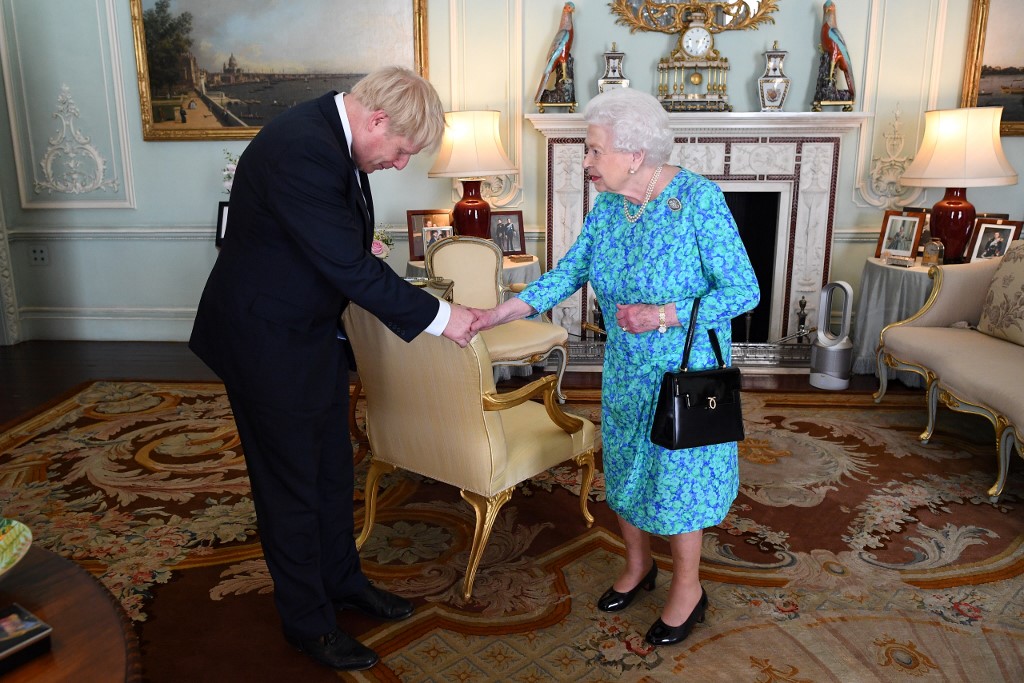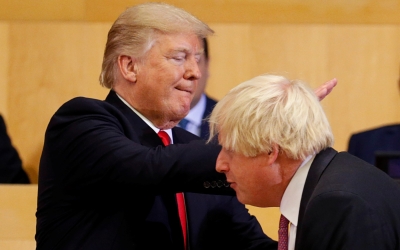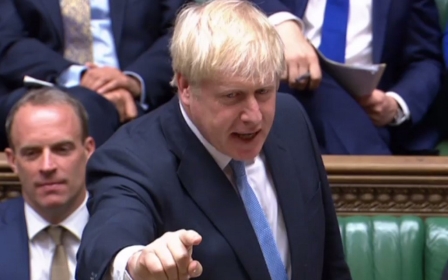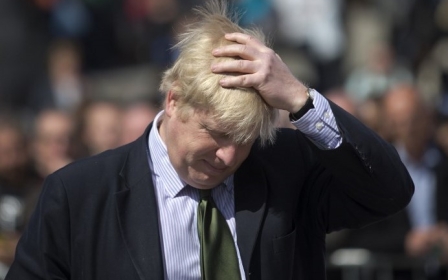It's time to end the sycophancy over Boris Johnson
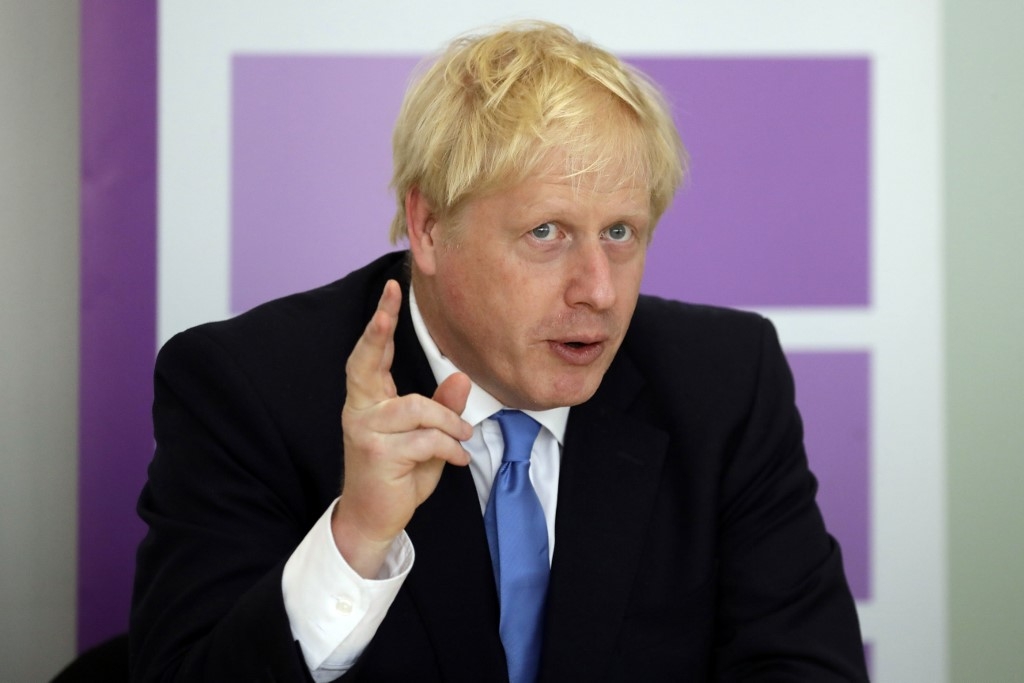
Imagine that it was Jeremy Corbyn, not Boris Johnson, who became prime minister last week.
Imagine that he had been put there by 93,000 mainly left-wing Labour members. Imagine he then reshaped the Cabinet to make sure it was filled with personal loyalists, immediately sacking almost every centrist minister and creating an extreme sectarian government.
Suppose that within minutes of kissing the hand of the Queen, Corbyn breached royal protocol by briefing the press about what the monarch had told him in private - and that the pound was in free-fall, hitting a two-year low, as the new prime minister committed himself to investing tens of billions of pounds in extra government spending within days of entering office.
Imagine that he'd just ditched his wife of twenty-six years standing, and the mother of his four children, and installed in Downing Street a 31-year old girlfriend.
Dismissed in disgrace
New MEE newsletter: Jerusalem Dispatch
Sign up to get the latest insights and analysis on Israel-Palestine, alongside Turkey Unpacked and other MEE newsletters
Now, let’s stretch credulity way beyond the breaking point. Imagine that Corbyn’s new home secretary had been forced to resign in disgrace just two years earlier for secret meetings with a foreign government - and that Corbyn knew this, but still appointed her.
Whatever Johnson does or says - however incompetent, immoral, ignorant or foolish - is strong, visionary and wise
And that his education secretary had also been recently dismissed in disgrace for a gross breach of national security. And that Corbyn knew this too, but refused to answer questions about the appointment. And that the new transport secretary had been found to have had a second job under a pseudonym while an MP - something he admitted to only after years of publicly denying the claims.
Let’s imagine Corbyn’s most senior adviser was in contempt of parliament after refusing to appear before and give evidence to a select committee - yet Corbyn appointed him anyway.
And imagine that Corbyn had promised an independent inquiry into antisemitism during his campaign, only to renege the moment he walked into No 10.
Media mockery
Obviously that’s all too improbable, so there’s no need for a mental experiment to imagine the media response. The outrage. The fury. The disbelief. The mockery.
The newspaper headlines would be universally hostile. Chaos in Downing Street. Corbyn and his government would be flayed alive.
But all this is exactly what happened within days of Johnson entering No 10 last week. The collapsed pound. The girlfriend trouble. The dodgy cabinet appointments. The royal indiscretion.
Admittedly, Johnson has not gone back on promises to investigate antisemitism, but he has reneged on his pledge to hold an independent inquiry into Islamophobia within the Conservative Party. Meanwhile, auto giant Vauxhall has warned it may take part of its manufacturing to southern Europe.
He’s nevertheless been widely praised for a faultless move into Downing Street. “It’s been a good week for Boris Johnson’s government,” drooled Christopher Hope, chief political correspondent for the Daily Telegraph.
The Spectator praised Johnson as a man “dismissed as a philandering clown” but who has “confounded” his critics “at every stage”. The Times discerned Johnson’s “decisive action” in creating his new cabinet. The Telegraph opined that Johnson’s no-deal strategy sent a “clear message to the EU”.
A flying start?
There have been exceptions. Peter Foster, the Telegraph’s Europe editor, has been a constant source of dry analysis of Johnson’s no-deal plans, while the Times also criticised Johnson’s “short-sighted” and “reckless” sacking of popular Scotland minister David Mundell.
But overall, the tone is gushing. I want to ask an important question: has Boris Johnson really gotten off to the flying start that the newspapers say he has? Or could it simply be that the rules of political reporting have changed?
Namely, that whatever Johnson does or says - however incompetent, immoral, ignorant or foolish - is strong, visionary and wise. The rules determine that only Johnson’s opponents can be ruled offside, and only he is allowed to score the goals.
Note that Vote Leave, the political campaigning organisation that won the 2016 referendum, has transferred to form Johnson’s political team in Downing Street. Many newspapers were propaganda outlets for Vote Leave in the weeks running up to the referendum.
They weren’t interested in truth. They were interested in winning. Now they’ve got their man - until last week the Daily Telegraph’s star columnist - into Downing Street. By definition, he can’t do anything wrong.
Command and control
The Daily Telegraph doesn’t even worry much when Johnson advocates outcomes that threaten the United Kingdom and show every sign of leading to economic failure and collapse. Imagine Corbyn suggested such policies: Telegraph columnists would throw up their hands in horror. Only the Daily Mail, where I am a columnist, has shown consistent scepticism about Johnson.
It's time Fleet Street woke up and asked difficult questions about Johnson's Brexit plans
We’ve seen nothing like this level of command and control of leading Fleet Street papers since the early years of Tony Blair, when editors and media bosses doffed their caps to Blair’s media advisers, Alastair Campbell and Peter Mandelson.
That ended badly. The lack of criticism of New Labour helped create the hubris that led to the Iraq calamity.
It’s time Fleet Street woke up and asked difficult questions about Johnson’s Brexit plans. If Brexit goes wrong, Johnson won’t be forgiven - nor will the papers that backed him. It’s time to end the sycophancy.
The views expressed in this article belong to the author and do not necessarily reflect the editorial policy of Middle East Eye.
Middle East Eye delivers independent and unrivalled coverage and analysis of the Middle East, North Africa and beyond. To learn more about republishing this content and the associated fees, please fill out this form. More about MEE can be found here.



